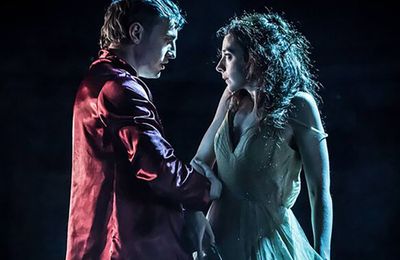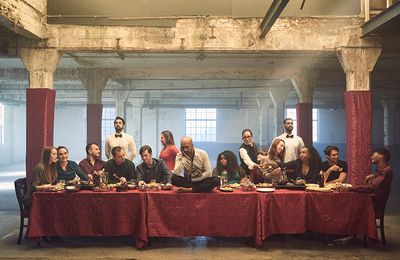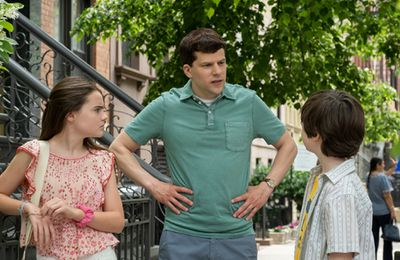Theatres still reeling from Covid, audiences crippled by the cost of living—right now, a night at the West End is not high on the average person’s priority list. To see how the industry itself is responding to this difficult climate, all you need to do is look left on a tube escalator, at the promotional images lining your way. Paul Mescal is Stanley Kowalski. Matthew Modine is Atticus Finch. Until recently, Emma Corrin was Orlando.
It looks like TV stars fronting West End shows has become the new norm, but it’s not just any kind of star that’s cropping up. They tend to be young; they’re usually breakouts from Netflix originals, or other streaming successes; and they’re often, but not always, venerated on social media as voices of their restless generation. She’s an academy-nominated film actress, but I would include Saoirse Ronan in this category. Her characters in two Greta Gerwig movies—Jo March in Little Women and Lady Bird in, well, Lady Bird—have become icons for the TikTok age. In 2021, Ronan debuted on the UK stage as Lady Macbeth at the Almeida theatre. Macbeth is exactly the kind of play we’re seeing these screen stars take on: a national classic but also, crucially, an A-level set text, meaning it’s a story that teenagers are already familiar with from the classroom.
But even if the play isn’t a household name, such casting decisions provide their own tantalising hook: not least because they take into account an actor’s formerly most iconic screen roles. Jessie Buckley appeared on screen as a young hopeful in a BBC musical talent search and a tortured wannabe-singer in Wild Rose: seeing her in a 2021 revival of Cabaret seemed an entirely logical progression. Likewise, Orlando felt like a natural fit after Corrin’s breakout role as The Crown’s Diana who, like Orlando, is an ennui-ridden nonconformist in a royal court; Corrin described her as “queer in so many ways”.
Sometimes however casting these actors seems designed to raise eyebrows and incite incredulity: “That’s so different from what I’ve seen them in before”, or “How are they going to pull this off?” Last June, Modine’s icy turn as the evil, kidnapping “Papa” in the fourth series of Stranger Things was streamed for a record-smashing 355m hours in its first week on Netflix. Just six months later, in November, Modine took to the stage as the paternal hero Atticus Finch in Aaron Sorkin’s adaptation of To Kill a Mockingbird. Similarly, from Connell Waldron in the BBC’s adaptation of Normal People to Stanley Kowalski in Streetcar is an extraordinary leap across the sexual dreamscape for Paul Mescal; from soft-edged, respectful gen Z lover boy to brutish rape fantasy.
On one level, this is a classic attempt to use stars to reinvigorate struggling theatres. What better way to get young people to fork out for a three-hour play (and revise for their English exams) than offering up their favourite actor? And it seems to be working. A Streetcar Named Desire’s transfer to the West End sold out in two hours. Prima Facie, starring Killing Eve’s Jodie Comer, sold out almost immediately; it left audiences flocking to the cinema to watch a filmed performance instead. It has now gone across the pond, to Broadway.
The tax on these extra ticket sales? A decline in the quality of theatre acting—or at least that’s what some people are saying. Danny Robins’ spine-tingler 2:22 A Ghost Story, running since 2021, has been ridiculed for being a revolving door for singers and soap-stars who fancy having a go on the West End. It’s a decent night at the theatre (turns out Lily Allen and Cheryl Cole are convincing occupants of a haunted house), but this approach to casting does deserve some scepticism. Ian McKellen, who worried in the early 2010s about declining performances because of disappearing repertory companies and celebrities bypassing classical training, would, I imagine, not be a fan of 2:22.
McKellen has a point: however much (or little) you care about acting calibre, there are uncomfortable injustices here. Left stranded by the decline of regional playhouses, it’s hard for actors to work their way up in theatre even without untrained celebrities jumping the queue. Importing the glitterati of Netflix into the West End isn’t exactly levelling up.
And certainly, there have been instances when the hop from screen to stage simply hasn’t quite worked out. Ronan’s Lady Macbeth is more plaintive than blood-curdling, her Machiavellian lines delivered in a pleading falsetto, her guilt played in a filmic style with head-bowed, eyes brimming with melancholy. It’s a deeply felt performance, but too understated for Lady Macbeth and too close stylistically to Jo and Lady Bird. I wouldn’t be surprised if the increasing number of West End debuts for young film stars leads to more low-key stage performances in the future.
The Sally Rooney TV universe is the epitome of low-key acting: it’s wall-to-wall whispered monosyllables and miniscule facial flickers. On stage, Mescal could easily have fallen into the same trap as Ronan—but he doesn’t. The director of this production of Streetcar, Rebecca Frecknall, ensures his performance is incredibly physical, choreographing him on all fours in a wolfish dance. As a result, Mescal’s Kowalski is a formidable predator, and his stiller moments, far from being dwarfed by the stage, quiver with terrifying potential.
So yes, some screen acting doesn’t translate well to stage, but some definitely does. And, more interestingly, there are a number of young screen actors for whom very little needs to be “translated”: they’ve already demonstrated on camera acting styles fit for centre stage. Aimee Lou Wood’s clear-as-a-bell Stockport inflections and masque-like expressions in Sex Education are already theatrical, fully prepped for her stint as Cabaret’s Sally Bowles. Jodie Comer’s metamorphic vocal abilities, as seen in Killing Eve, are perfect for a one-woman show. Her performance in Prima Facie smacks of Villanelle, moving seamlessly from comic to horrifying, as though shedding her skin.
Lou Wood’s background is in theatre, whereras Comer’s is not. Yet Villlanelle is one of the most theatrical BBC characters in recent memory. Comer shows us not all screen acting is Normal People-esque mumbles, and that you don’t need a classical background to be capable of a towering stage performance—McKellen would be relieved. If the critical success of Lou Wood in Sex Education and Comer in Killing Eve are anything to go by, we might see more theatrical screen performances too. Maybe we’re looking at change in both directions.
The other change going on here relates to sex. It’s no coincidence that Mescal, Lou Wood and Corrin came to the West End fresh from projects in which they had full frontal erotic scenes—Mescal in particular became an overnight sex symbol. But casting these actors isn’t just an attempt to sex up Tenessee Williams with a modern-day Marlon Brando. It’s integrating not just sex appeal into theatre, but sex-positivity. Sex Education and Normal People, debuting in 2019 and 2020 to record-breaking streams, inaugurated together a clunky, euphoric televisual sex that tackled anatomical and political minefields through the eyes of teenagers. Seeing these actors fronting big-hitting plays feels like an endorsement of this kind of sex by the wider cultural establishment. It’s a big deal, most of all in Orlando, which ran for three months into early 2023 against the backdrop of enormous agony for transgender people in the UK. While the UK government blocked Scotland’s Gender Recognition Bill, Twitter and the press played host to vicious debate about identity politics and child safety—the notion of changing gender has never been more fraught. The sex-positivity Corrin exudes as the titular protagonist, discovering their newly bestowed womanhood with wide-eyed joy, is a bewitching antidote to the negativising “culture wars” going on outside the theatre.
The elitism that comes from the death of regional repertory theatres and celebrity casting is concerning. But to the purists worrying about the next generation of actors: you won’t necessarily be seeing worse performances. You might even be surprised to see some better ones. So far, we should be glad that the gen Z screen stars entering West End theatres have brought some of the good things about their generation with them.














